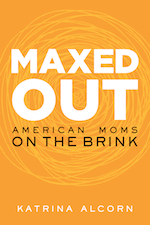
Peter Van Schaick is an employee rights lawyer and a reader of social science theory. He's here to help.
Meet my Uncle Peter.
He’s a really cool guy who reads a lot of social science theory, lives part of the year on a cooperative in Vermont, and convinced me, when I was 22, to be a union organizer. (I made it through 21 consecutive 12-hour days, then told my boss that perhaps unions should treat their own employees better. And that was the end of that.)
Uncle Peter also happens to be an employee rights lawyer in New York and has talked with more than a thousand women and men about their work lives over the course of his career. He knows a few things.
Uncle Peter has a theory about why conditions are so difficult for working moms. It has to do with how we think about problems. It’s a little complicated, so I’m going to get him to help me explain it.
But first, 2 quick definitions:
Dispositionist = Someone who tends to blame the individual’s disposition when things go wrong.
Situationist = Someone who tends to blame the situation when things go wrong.
Example from real world problem: Child obesity
We have a serious problem with child obesity in America. In fact, this generation of young people has a lower life expectancy than their parents’ generation. [1] What’s going on?
A dispositionist might think this: These children are lazy! Their parents are either ignorant or simply don’t care! (The individual is the problem.)
A situationist might think this: Corporations are brainwashing children with advertisements for junk food! Families don’t have time to cook anymore, because both parents are busy working and commuting, so they resort to fast food! (The situation is the problem.)
In reality, if we want to solve this problem, both things come into play–individuals could make healthier choices, and we as a society could create situations that support those choices.
OK, Pete. Tell us about your theory.
UNCLE PETER: We humans are far from rational actors. We have a tendency to be dispositionists when we’re judging other people’s behaviors. Yet social scientists tell us that the situationist perspective more accurately reflects reality.
So, people will readily accept the blaming of victims because it follows our dispositionist tendencies. Yet blaming victims distracts attention from situations that may have caused the event, and are blame-worthy. Our dispositionist bias impairs our social capacity to understand events and to correct problems.
Did you get that? So when something goes wrong, we tend to blame the individual (those ignorant parents) rather than looking at the situation (junk food ads, lack of time to cook, soda machines at school). But social science says that the situation has a tremendous impact on our behavior. OK, now I’m going to apply this directly to working moms.
Our situation: We live in the country with the most work-family hostile policies of any developed nation in the world. And they affect everyone, from the working poor to the professionals. [2] Many of us lack affordable, quality childcare, paid maternity and paternity leave, and flexible schedules. And for those of us who actually have those things, we’re often expected to work ridiculous hours so even when we’re “off work” we’re still answering phone calls, checking email, and writing reports late into the night. We’re competing with the guys who have stay-at-home wives and the people without kids, who are able to keep working after the daycare is closed for the day.
On some level, we all know things are tough for working parents. And yet, when things don’t go well–a coworker keeps getting sick and missing work, someone we know breaks down from the emotional stress of trying to manage everything–we tend to think that the individual is doing something wrong. (She has too much guilt! She’s just an anxious person! She’s doesn’t hire enough help! She doesn’t make her kids wash their hands enough!) She lacks some strength in character. We blame her, not her situation.
Uncle Peter again…
UNCLE PETER: A professor of psychology at NYU named John Jost has been doing research on how we view our social systems. He sees a tendency to believe that society is fair and just, even when it’s obviously not. And that goes for working moms, too. This tendency to justify the life one leads as embedded in a legitimate system, binds tight an illusion that all is right.
We have a hard time seeing how difficult our situation really is, because we desperately want to justify the life we’re leading. When we can’t do it any more, naturally we blame ourselves. It can’t possibly be the system we live and work in that let us down.
This is what happened to me. I tried everything I could think of to “balance” my career and family and when I still couldn’t make it work, I felt like a failure. There are women and men all over this country who feel like failures because their work and home lives are incompatible.
This sense of shame, this focus on personal failure is a distraction. If we don’t stop blaming ourselves and look at the bigger picture, then we’ll never be able to change policies in our government, in our workplaces, and in some cases, in our very homes, that are making the situation so unbearable for so many of us.
I’ll say that again in more positive terms. When we understand that there are powerful, systemic causes for the problems working families face, we will be empowered as voters, workers, consumers, and parents to do something about it.
Want to do something right now?
Forward this to your friends. Make a donation to an organization that’s trying to fix the problem, like momsrising.org. Tell a hard working mom you know that she’s doing a great job.
[1] You can watch Jaime Oliver’s incredible talk from this year’s TED conference in Long Beach about how he plans to address the problem of child obesity.
[2] Joan C. Williams of the Center for WorkLife Law and Heather Boushey of the Center for American Progress called “The Three Faces of Work-family Conflict: The Poor, the Professionals, and the Missing Middle.” Published January 2010.





{ 7 comments… read them below or add one }
Well said, Pete!
Your uncle sounds like a pretty smart guy. Glad I found your blog! I’ll definitely make it a regular stop.
Spot on Katrina and Uncle Peter. Spot on. I was raised on the belief system that the individual is in charge of their fate, anyone can crawl out of their doom etc. etc. Ironically, my parents who I love very much and who taught me to love but also fend for myself are now at retirement age and worse off then they were when I was a kid, given the decline of the middle class and in general, the socio-economic disparities people face when you don’t own a home, you have too much debt, you live on low wages, etc.
It is a blame game, but it shouldn’t be. Take accountability for the things you CAN control as a human being, and acknowledge that self-determination alone will not get you the American dream. In fact, the American dream does not equal true security and/or success anymore, if you really think about it. There are forces at play that continue to give a rat’s ass about our security, and they only get more powerful.
I for one am on board for solving the problem.
great post!
I would also add that the situationalist vs dispositionist contrast has deep cultural roots. The US is a more individual-centered culture. Denmark would look to the situation before the individual, so would Japan and China. We think about how we are responsible or to blame because we have been told in this culture that we’re in control of everything and if we work hard we’ll succeed, etc etc. Context is rarely included in the explanations.
Another related example is that in Japan, school children are more routinely asked to describe how something happens rather than why. They focus more on process than cause-effect. In the US, children are asked why.
This reminds me of a book I read a while ago called “The Two Income Trap” which describes how when we were kids, many our parents generation could afford to buy a house/pay rent etc and have one parent stay at home with the kids. Now, especially in the Bay Area, both parents need to work to be able to afford the same things so there is no hope of getting out of the trap. I can’t remember the book’s solution to this problem but the whole crazy idea really struck me as so true especially as house prices soared in the 90’s. It seems to me also that the workplace rules have not changed much since those days when one member (usually the man) was the worker and the other stayed home. The whole system needs to change to meet the changing needs of families today. It is ridiculous that working parents only have 5 sick days a year and only 2 weeks vacation and limited flexibility. Does your children and you only get sick 10 days out of a year? I know my kids are sick more than that. I often tell people that back in the UK, where I am from, workers start with 4 or 5 weeks vacation when they start a job and at least 2 weeks of sick pay. They don’t have to accrue the vacation over the year, they just get it when they start (as long as they pass their probationary period). The work week is 37.5 hours (not 40) and people usually take at least two breaks during the day to chat and have coffee or tea. These people are just as productive as here. Also back there, there isn’t the need to work at least 20 hours a week so you can get health insurance which is one of the big ticket items today that people can’t afford except through work. They have socialized medicene which I know isn’t perfect, but its available.
Is there really a country that has this figured out? As bad at it is, my suspicion (correct me if I’m wrong) is that America may actually the *best* country for working women — if the measurement of success is fraction of women in various jobs, as opposed to, say, ‘happiness’. As a research scientist (and this is probably true for many go-at-your-own-pace fields… like journalism, for example) either you get your stuff done or you get scooped. There is no ‘fairness’ appeal. The guy with the stay-at-home wife, or the gal with no kids will have (all other things being equal) a professional edge. I think (I’m hoping) that the solution is *temporary* ‘mommy-track’ positions. Note the *’s. That’s the part that is really missing currently, for no good reason, as far as I can tell. I read somewhere recently that Justice O’Connor was a stay-at-home mom for 5 years. Could that happen today? Are we getting worse??? Here’s my theory: temporary mommy-track + health-care that is not related to employment = happy working moms. I’ll get back to you on that!
I love reading through a post that can make men and women think.
Also, many thanks for permitting me to comment!
{ 1 trackback }